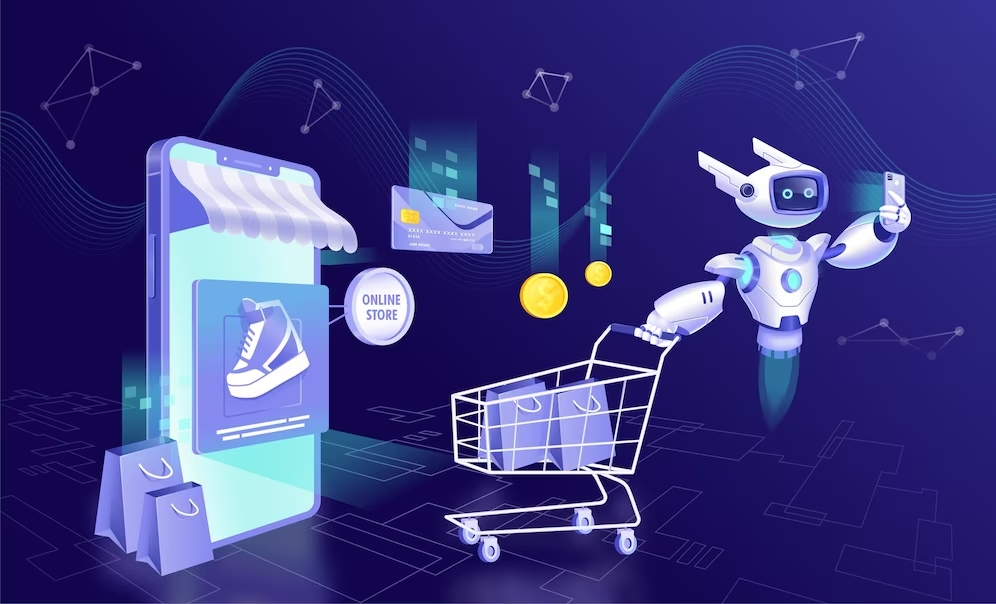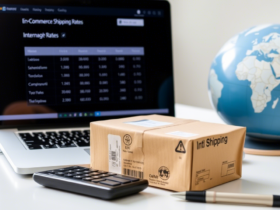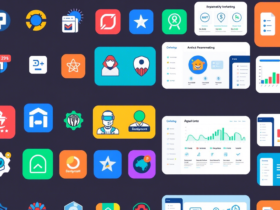E-commerce is the process of buying and selling goods or services online. It has been growing rapidly in the past decade, reaching a global revenue of $4.28 trillion in 2020. However, e-commerce is also facing many challenges, such as increasing competition, changing customer expectations, and complex logistics. To overcome these challenges, many e-commerce businesses are using AI tools to enhance their performance, efficiency, and customer satisfaction.
AI tools are software applications that use artificial intelligence (AI) to perform tasks that normally require human intelligence, such as learning, reasoning, and decision-making. AI tools can help e-commerce businesses in various ways, such as:
- Adapting marketing strategies on the fly: AI tools can analyze customer data, market trends, and competitor actions, and adjust marketing campaigns accordingly. For example, GetResponse is a marketing automation platform that uses AI tools to create personalized and relevant email campaigns, landing pages, and webinars for e-commerce businesses.
- Understanding what your customers want: AI tools can understand customer needs, preferences, and feedback, and provide tailored recommendations, offers, and content. For example, Shopify is a popular e-commerce platform that uses AI tools to create personalized product recommendations, dynamic pricing, and email marketing campaigns for its users.
- Analyzing your competitors’ strategies: AI tools can monitor and benchmark your competitors’ performance, pricing, and marketing, and help you identify gaps and opportunities. For example, Kount is an AI-based fraud prevention platform that integrates with e-commerce platforms such as Shopify, Magento, and BigCommerce and provides real-time fraud detection, chargeback prevention, and identity verification.
Shopify:
is a popular e-commerce platform that lets anyone create an online store with ease. But it’s not just a simple website builder – it also uses AI to help merchants grow their businesses.
For example, Shopify Magic is an AI feature that generates product descriptions for you in a snap. All you need to do is enter some keywords and choose the tone you want, and voila – you get unique, catchy blurbs that fit your brand. This saves you a lot of time and hassle from writing endless descriptions yourself.
But that’s not all. Shopify also has a range of AI apps that you can use for various purposes, such as customer service, fraud prevention, recommendations, and more. We’ll explore some of the best ones in this article.
Shopify’s AI features are still evolving compared to standalone tools, but they show the potential. For smart merchants, these tools help them automate boring tasks and discover hidden opportunities. Things that used to require a team of experts are now possible for solo entrepreneurs.
Shopify is constantly improving its AI offerings and opening up its app platform for third parties to create innovative AI Shopify apps. For e-commerce brands looking to level up their game, AI gives Shopify an edge over other platforms.
But they also know that technology is not enough. Shopify’s goal is to empower merchant success – not replace the creativity and vision of real people. Combining human ingenuity with AI’s power – that’s where the real magic happens. The future is bright for merchants who are ready to embrace this wave.
GetResponse:
GetResponse is a comprehensive marketing platform that helps e-commerce businesses grow and succeed. It uses powerful AI tools to create and optimize online stores, email campaigns, and product recommendations.
One of the key features of GetResponse is its AI-powered website builder that lets you design attractive and functional e-commerce sites without any coding. You can choose from a variety of templates and customize them to fit your brand and style.
Another way GetResponse uses AI is to generate personalized product recommendations for each visitor based on their preferences and behavior. By using machine learning, GetResponse can match your products to the right customers and increase conversions.
GetResponse also has an AI feature that helps you create effective email campaigns for your e-commerce business. It generates industry-specific emails with catchy subject lines and engaging content that are aligned with your goals.
GetResponse takes care of the tedious tasks so you can focus on the big picture. If you want to connect with your customers in a more relevant and meaningful way, GetResponse has the AI-driven tools you need to stand out from the crowd.
With GetResponse, you can leverage AI to automate, personalize, and design your e-commerce marketing strategy. GetResponse is the ultimate marketing platform for modern digital commerce.
You can read:
https://tipsloves.com/the-best-platform-to-create-an-online-store/
Gorgias:
Gorgias is an AI customer service software that helps e-commerce businesses on Shopify, Magento, and BigCommerce streamline their support. It integrates different channels like email, live chat, and social media into one central hub. This allows agents to see the whole customer journey in one place.
The main feature of Gorgias is its AI helpdesk software. It uses machine learning and natural language processing to analyze past tickets and learn how your brand communicates.
Then, the AI can suggest responses to common questions that match your brand voice. This reduces the time agents spend typing replies.
The AI provides draft answers for agents to check and edit as needed. This way, support remains personal and consistent. It takes care of the routine tasks so agents can focus on building relationships.
For e-commerce brands, scaling service while maintaining quality is challenging. Gorgias aims to make it easier with AI. The technology handles the work so the human touch can shine.
This enables merchants to offer personalized support that customers appreciate as they grow. In short, Gorgias uses AI to simplify customer service and scale it smoothly.
Katana:
Katana is a cloud platform that helps e-commerce businesses scale their inventory and order management. It connects all your sales channels into one dashboard for real-time visibility. No more switching between spreadsheets and inventory systems!
Katana also assigns materials automatically based on what’s required to complete orders. This helps you plan ahead and avoid running out of stock.
The platform coordinates production with manufacturing capacities so everything runs smoothly. You can make smart decisions on purchasing and manufacturing based on data rather than guesses.
By linking your e-commerce store with Katana, you can avoid mistakes from manual data entry. We all know how one typo can mess up an entire order!
The software tracks real-time inventory across locations and matches it with sales demand. This allows you to monitor stock levels and prioritize channels as needed.
With simple drag-and-drop prioritization, sales teams can stay updated on order status and completion estimates. No more chasing manufacturers for updates!
In a nutshell, Katana offers powerful technology but aims to make inventory management easy for growing e-commerce businesses. By consolidating data and processes, it gives you the clarity you need to scale effectively.
CreatorKit:
Creator Kit is an AI-powered tool that helps you create stunning photos and videos for your e-commerce marketing.
With Creator Kit, you can easily select your product from the Shopify admin and let the AI transform your product images into engaging content.
You can also customize your photos with any background you want using the AI photo tool.
If you want to make videos, Creator Kit has you covered. You can use hundreds of video templates and your product photos to make eye-catching videos in seconds. You can also edit your videos online with the editor that is fully integrated with Shopify.
You can change the backgrounds, add images, videos, fonts, design assets, and more to your videos.
You can also set up your brand kit that will automatically apply your brand and all the video templates.
Jungle Scout:
Create and optimize powerful listings for Amazon with Jungle Scout’s Listing Builder. This tool uses OpenAI’s ChatGPT to generate captivating content for your product listing based on the best keywords from your keyword bank.
With Listing Builder, you can import your existing listings or start from scratch. Then you can choose your keywords and start optimizing.
You can easily find the most important keywords that are missing from your listing by looking at your keyword bank, which is sorted by search volume.
You can also use Listing Builder’s AI Assist to generate a catchy title, persuasive bullet points, and a detailed product description with just one click. It will use your top keywords to create content that attracts customers and boosts your ranking.
You can also get real-time feedback and suggestions from Jungle Scout’s AI-driven listing optimization score as you edit your listing. Listing Builder will also save your changes automatically, so you don’t have to worry about losing your work.
When you are done, you can sync your listing to Amazon with one click. Listing Builder will update your product listing on Amazon instantly. Listing Builder makes the optimization process easy and fast, so you can save time and be confident in your keyword strategy.
AiTrillion:
AiTrillion is an e-commerce marketing platform that uses artificial intelligence to help brands increase their productivity and ROI. It offers a range of features that help brands connect and communicate with their customers more effectively.
One of the key features is AI-driven customer segmentation. This feature allows brands to create and understand different customer groups and tailor their campaigns accordingly.
Another feature is AI-powered product recommendations. This feature provides personalized product suggestions based on each customer’s preferences and behaviors. This feature aims to increase customer engagement and satisfaction.
AiTrillion also has email marketing automation. This feature helps brands send relevant and timely messages to their subscribers based on their segmentation, dynamic content, and more.
The platform also has customer analytics that use AI to generate insights on customer preferences and behaviors. These insights help brands make better marketing decisions.
AiTrillion integrates easily with major e-commerce platforms and makes AI-enhanced marketing simple and efficient.
To sum up, AiTrillion leverages artificial intelligence to improve various aspects of e-commerce marketing, from segmentation to personalization. It provides comprehensive and customized solutions for brands that want to increase their relevance and ROI in the competitive e-commerce market.
HubSpot:
HubSpot is a free CRM platform that helps e-commerce businesses sell smarter and build lasting relationships with their customers. It syncs with Shopify and WooCommerce to collect data on customer behavior and preferences. This allows you to create personalized interactions throughout the customer journey.
With HubSpot, you can market your products on multiple channels and send the right message to the right person at the right time. You can also automate the repetitive tasks and focus on your strategy.
HubSpot lets you track your key revenue metrics across channels in one place with the e-commerce marketing dashboard. You don’t have to switch between different reports anymore!
HubSpot believes that e-commerce is not just about transactions, but about human connections. Their CRM platform helps you understand your customers as people and deliver the kind of experience they expect from their favorite brands.
HubSpot takes care of the technical aspects like data syncing, campaign automation, and reporting. This gives you more time to provide that personal touch that makes your customers loyal and happy.
To sum up, HubSpot is a free CRM platform designed for the needs of modern e-commerce. It enables you to connect with your customers as humans and build loyalty through relevance.
AfterShip:
AfterShip is a post-purchase customer experience platform that helps brands build loyalty after checkout. It offers a range of tools to improve the post-purchase journey, from shipment tracking to easy returns.
The platform is famous for its proactive tracking, which keeps customers informed and reduces customer service inquiries. It also simplifies the return process, which helps brands keep their customers and revenue.
Another feature of the platform is warranty automation, which makes it easier for customers to claim their warranties and for brands to gain product insights. AfterShip also protects the shipping revenue, by offering shipping insurance and hassle-free claims.
One of the most notable features of AfterShip is the Estimated Delivery Date (EDD) powered by AI. This feature provides accurate and updated delivery estimates for customers, which is important for e-commerce. Customers often base their purchase decisions on the delivery time, so having clear and reliable estimates can increase trust and satisfaction.
EDD uses AI to predict the delivery date based on various factors, such as holidays, weather, and traffic. It also communicates with customers proactively, to avoid missed deliveries and confusion. EDD works seamlessly with major platforms like Shopify.
To sum up, AfterShip uses AI and automation to enhance the post-purchase experience. It provides proactive tracking, smooth returns, and accurate EDD by AI, which can boost loyalty and revenue.
Maropost:
Maropost is a premium eCommerce solution that consists of two modules: commerce cloud and marketing cloud. It uses AI and machine learning to analyze customer data and behavior and optimize marketing campaigns and revenue.
Maropost’s eCommerce platform has an AI-powered site search and personalization feature that delivers relevant and customized search results and improves store conversion rates.
Maropost also has Da Vinci, an enterprise AI that uses machine learning and machine intelligence to provide advanced marketing automation capabilities.
Moreover, Maropost recently acquired Findify, an AI-powered eCommerce platform that uses machine learning and big data to offer next-generation merchandising, search, product recommendation, and more.
Ocoya:
Ocoya is an AI-powered social media marketing platform that helps eCommerce businesses manage their social media campaigns. It offers you over 10,000 social media templates, graphics, music, etc., for different niches, as well as the ability to schedule posts across various social media platforms and analyze engagement insights.
Ocoya also analyzes the image or content you upload and generates relevant and trending hashtags for your niche. You can then post it on your social media with ease.
Another feature of Ocoya is Travis AI, an AI copywriting tool that creates captivating AI-generated copies that match your brand’s voice, understand your audience, and target them with the right content. You can use Travis for social media, landing pages, and most importantly, product descriptions for your online store.
Octane:
Octane is a powerful AI tool for eCommerce that helps you understand and personalize your customers’ shopping experience. With its quiz builder, you can create interactive quizzes that guide your customers to the right product, educate them about your brand, and increase your conversion rate. Octane serves thousands of Shopify and eCommerce brands and uses AI and customer insights to create a customized shopping journey for each customer.
Octane also has an Insights Analyst feature, which uses AI to analyze all of your product reviews. This feature is very helpful if you have a lot of reviews, as it extracts useful information that can help you improve your business strategies.
ScrapWave:
ScrapWave is an amazing AI tool for dropshipping that helps you find profitable and unique products. If you run an eCommerce business based on dropshipping, you can use this software to discover products that have high demand and low competition.
With ScrapWave, you can stand out from the crowd and gain a competitive edge by selling products that are not widely available.
Instead of competing with others on low margins, you can earn more by exploring new and untapped niches of products.
The platform claims to scan over 20000 products every hour for their eCommerce customers.
ActiveCampaign:
ActiveCampaign is an AI-powered customer experience platform that helps e-commerce businesses create stronger connections and marketing.
The platform lets you personalize your outreach based on how people browse and shop, so you can send messages that match their interests and needs. This way, your communications feel like a natural part of the shopping experience.
You can also segment your audience and design targeted campaigns, using the AI features to analyze data and find insights that make your messages more relevant.
You can reach your customers through various channels, such as email, text, social media, and more. The platform also automates tasks like cart recovery, so you can focus on your strategy.
ActiveCampaign works with all the major e-commerce platforms, so you don’t have to worry about integration issues. You can spend your time creating strategies, not fixing problems.
In short, ActiveCampaign helps you move from basic email lists to meaningful customer relationships powered by AI.
Their goal is to help you build loyalty by treating your customers as individuals, not transactions. The future of retail is personal, and ActiveCampaign wants to help you get there with the help of technology.
Best E-commerce AI Tools Conclusion
We hope you enjoyed our list of the best AI tools for e-commerce in 2023 that are changing the way online shopping works.
AI is making a huge impact on various aspects of running an online business, from small Shopify stores to large e-commerce brands. The tools we reviewed demonstrate the amazing potential of artificial intelligence in domains like marketing, customer support, inventory management, and more.
AI can be a worthwhile investment for e-commerce, as it can bring long-term benefits. As the technology keeps advancing, AI e-commerce tools will likely become more essential than optional.
However, not all platforms that claim to have AI capabilities are reliable. We suggest looking for platforms that have proven results, happy customers, and easy integration with your tech stack. Choosing the right partner can help you achieve lasting success.
The future looks promising as AI enables online retailers to access data-driven insights that were once exclusive to big corporations. But the human touch is still important – even tech-savvy customers want personal connections.
Smart brands will use AI to enhance their strengths, not replace them. With people and technology working together in harmony, e-commerce is ready for a revolution. Although change can be challenging, the potential rewards are worth the effort for those who have the vision to see what’s possible.





Leave a Reply